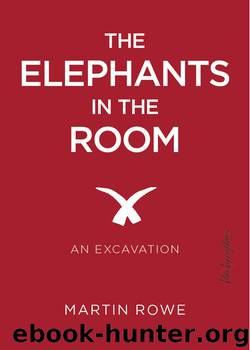The Elephants in the Room by Rowe Martin

Author:Rowe, Martin
Language: eng
Format: epub
ISBN: 9781590563885
Publisher: Lantern Books
On reflection, I probably shouldn't be surprised that I was apparently uncomprehending of these stories' political and social realities, as opposed to their psychological or symbolic import; or that I merely valued them as entertainments and not instructive in some way about my economic, social, and racial privilege. The books I devoured as a younger boy included the Belgian Hergé's Tintin in the Congo (with its caricatures of Africans as thick-lipped, child-like buffoons) and Frenchman Jean de Brunhoff's stories about Babar the elephant (the bipedal, clothed king of the beasts, who orders his fellow creatures to clear the forest in order to build the tidy little houses of Celesteville). I recollect no questioning of whether such a view of Africa and Africans—bestialized, infantilized, or anthropomorphized—might have changed in the forty years since these books first came out and I read them. Nobody suggested to me that these texts might be inappropriate or out of date.
At eight or nine years old, I became a devoted reader of the series of books by Canadian naturalist Willard Price (1887–1983), which featured a thirteen-year-old American, Roger Hunt, and his nineteen-year-old brother Hal traveling around the world (occasionally with their father, John) catching animals for zoos, circuses, carnivals, menageries, and film companies, and fighting off poachers, corrupt officials, and other ne'er-do-wells who are intent on killing animals and not just capturing them.
Several of these tales are set in East Africa, and I decided to re-read three of them (African Adventure [1963], Elephant Adventure [1964], and Safari Adventure [1966]) before writing this book, on a hunch that they might contain hints about the imaginative world I inhabited forty years ago. Sure enough, in addition to extremely dubious messages regarding our relationship with wildlife and male with female (which we'll explore in later chapters), the three books throw up a miasma as (in)toxic(ating) to one's perspective and awareness of the self and the other as that through which Marlow travels toward Kurtz.
African Adventure draws upon a motif that Kurtz would have recognized: the barbaric and bizarre ethno-religious practices of native peoples who need to be put in their place by, and subjected to the rule of, white people. Complicating the efforts of John Hunt and the boys to capture an array of big game is that Joro, one of their thirty-strong team of African support staff, is a member of the secretive Leopard Society (the name of an actual Mau Mau–like movement that operated in West Africa in the early twentieth century). Joro has been ordered by his fellow Leopard members to kill John and his two sons, or risk the death of his own wife and children. The boys are mystified as to why Joro would want to harm them. It seems senseless. Fortunately, their father is on hand to provide a reason—one that echoes some of the thinking we're familiar with:
It makes African sense. It makes Leopard Society sense. This isn't London. A couple of dozen African countries have become independent during the last few
Download
This site does not store any files on its server. We only index and link to content provided by other sites. Please contact the content providers to delete copyright contents if any and email us, we'll remove relevant links or contents immediately.
Becoming by Michelle Obama(10029)
Beartown by Fredrik Backman(5756)
The Last Black Unicorn by Tiffany Haddish(5639)
Man's Search for Meaning by Viktor Frankl(4607)
The Book of Joy by Dalai Lama(3987)
The Five People You Meet in Heaven by Mitch Albom(3569)
In a Sunburned Country by Bill Bryson(3544)
The Choice by Edith Eva Eger(3469)
Full Circle by Michael Palin(3450)
The Mamba Mentality by Kobe Bryant(3283)
The Social Psychology of Inequality by Unknown(3031)
Imagine Me by Tahereh Mafi(2962)
Book of Life by Deborah Harkness(2939)
The Checklist Manifesto by Atul Gawande(2855)
Less by Andrew Sean Greer(2696)
A Burst of Light by Audre Lorde(2610)
The Big Twitch by Sean Dooley(2437)
No Room for Small Dreams by Shimon Peres(2368)
Everest the Cruel Way by Joe Tasker(2343)
